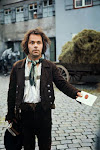Nesse entremeio, encontrei muita coisa recolhida e arquivada que o individuo que guarda sempre julga interessante. Entre elas, um recorte de uma noticia de um material que vi durante a Publishing Expo, que visitei ano passado pela JungleDrums. Na controversa condicao de “jornalista” o assunto me deixou com uma pulga atras da orelha, nem sei se pra bem ou pra mal.
Em especial para os amigos/colegas da area, que eventualmente ainda nao ouviram falar sobre isso, segue alguma informacao, apenas em ingles, sobre o incrivel papel eletronico e o caminho, mais do que nunca visivelmente claro, para uma revolucao das publicacoes.
----------------------------------------------
Sorting out papers. And it is a lot of them. Indispensable activity of a change, huge one, which approaches and whose topic a lot will be written about. It, by the way, alters the very nature of this blog on its purpose; however, other ends will be set for the same mean.
Amongst this, I have found many stuff collected and filed that only the individual who keeps it judge interesting. One of these things was a clipping of a news about a material that a witnessed during the Publishing Expo, which I visited last year as a JungleDrums staff. At the controversial “journalist” position, the subject has triggered my curiosity but not sure if in a good or bad sense.
Especially to friends/colleagues of the field, who eventually have not heard about it yet, follows some information about the incredible e-paper and the clear track for a publishing revolution.
E-paper, instant magazine, downloads, social publishing. Web 2.0 and the end of the newspaper as we know it – welcome to the brave new world of publishing, or is this all just pie in the sky?
It won’t be long before buying a copy of your favourite newspaper (I would not say Diario Popular or whatsoever, but it is absolutely up to you) could become as niche activity as buying a vinyl LP. Instead of leisurely flicking through a magazine on the sofa with a cup of tea, you will read it on the web, download it to a piece of e-paper or simply publish it yourself.
According to David Renard, author of The Last Magazine, in the next 25 years only 10% of the European and American paper-based magazine industry will remain, kept alive by “connoisseurs, aficionados and ageing Luddites”. The rest of us will embrace the publishing revolution.
Such predictions are always suspicious, but despite the well know apocalyptic tone that is often heard from different sources when it comes about technological novelties, it is amazing to imagine the way things may be working so soon. Instead of nipping to the newsagent, you will download the day’s news from a vending machine and read it on a piece of e-paper. And when you finish, you’ll put the e-paper in your briefcase and update the content the next day.
E-paper is already available (be amazed!). Sony introduced its e-book device in 2006, but Japanese company Fujitsu will launch what it claims is the first colour e-paper this year. The manufactures say the e-paper “looks like colour newsprint, it is though, flexible, very thin and you could change the image on it every two seconds for a year using tripe A battery.” The technology is already being used in Japan (of course!) where members of a music club get flyers containing reviews.
For the members of this odd field, the follow is worthy to notice. “Journalists will (increasingly) become freelance, but they will get a share of the advertising revenue if their stuff is read and will make a lot of money if they are at the top of the rankings. Social publishing might mean that there’s a lot of rubbish written, but author ranking technology can judge which is the highest quality content, so the best rises to the top.
* Article adapted from The Guardian (12 February 2007)



